Key takeaways:
- Speakers ignite passion and motivate action, creating opportunities for personal and professional growth through shared experiences.
- Identifying potential speaker partnerships involves researching backgrounds, assessing audience alignment, and engaging at industry events.
- Building genuine connections through authentic conversations and thoughtful questions fosters trust and rapport with speakers.
- Consistent interaction, celebrating milestones, and seeking feedback enhance and strengthen long-term relationships with speakers.
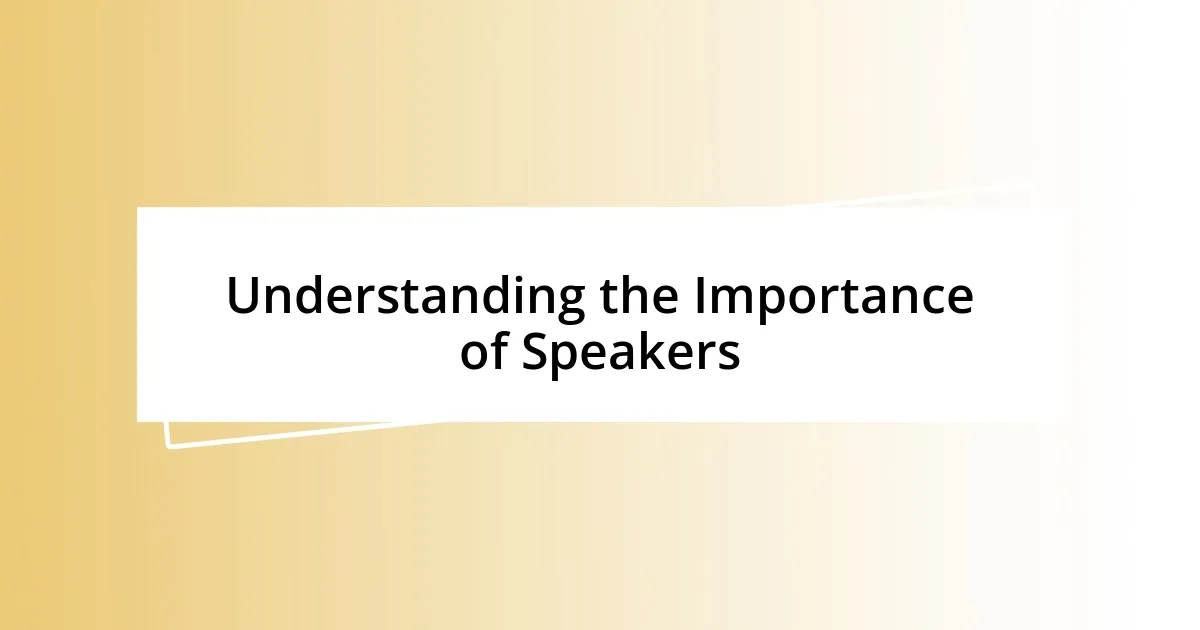
Understanding the Importance of Speakers
Speakers play a pivotal role in shaping conversations and transmitting knowledge. I’ve often found that attending a talk can be a transformative experience. Have you ever left a presentation inspired to make a change? That’s the power speakers wield—it’s not just about sharing information, but about igniting passion and motivating action in their audience.
Moreover, developing a connection with speakers is essential for creating a vibrant community. I remember when I first networked with a speaker after a conference; it led to opportunities I never imagined. Those personal connections can turn a fleeting moment into a long-lasting impact, fostering collaboration and shared ideas that stretch far beyond that initial encounter.
Finally, let’s consider the perspective speakers bring to the table. They offer unique insights gleaned from their own experiences, which can be invaluable. When I hear a speaker share their struggles and triumphs, it resonates on a deeply personal level. Isn’t it comforting to realize that we’re all navigating our journeys together? This understanding makes engaging with speakers not just important but essential for personal and professional growth.
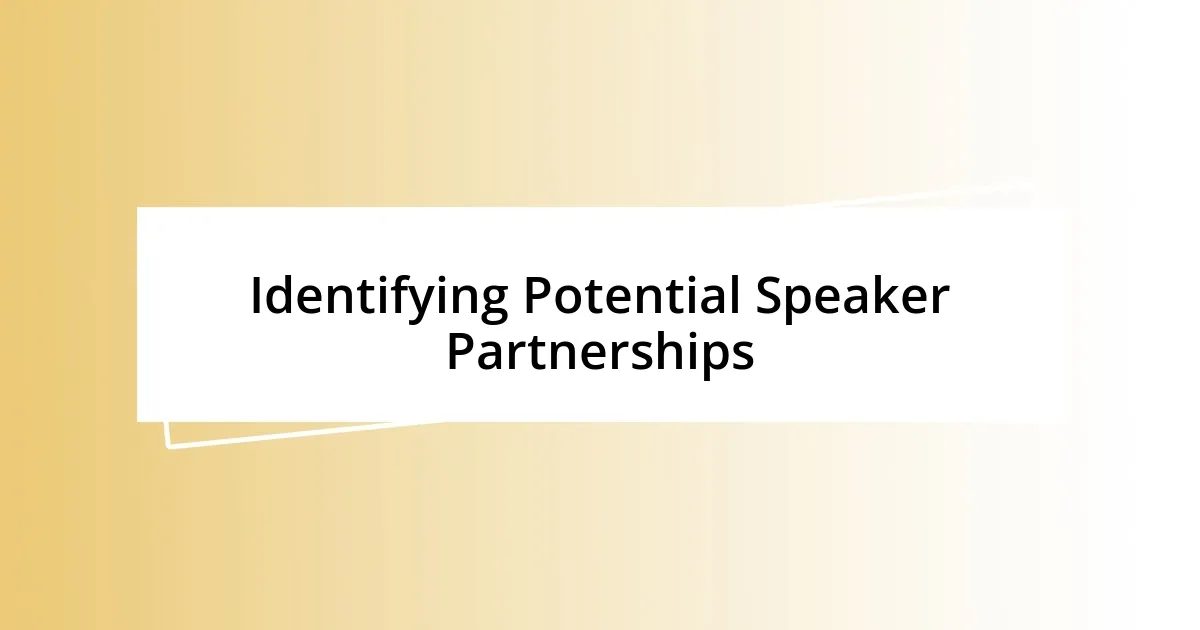
Identifying Potential Speaker Partnerships
Identifying potential speaker partnerships lies in recognizing shared interests and aligning goals. I’ve found that scanning industry trends and events can often reveal speakers whose messages resonate with my mission. When I attended a workshop on mental health, I discovered a speaker who not only captivated the audience but also shared my passion for promoting awareness in that area. That moment illustrated how crucial it is to seek out those voices that reflect your values.
Here’s a brief guide to help you pinpoint potential speaker partnerships:
- Research Their Background: Look for speakers with relevant experience or expertise in your field.
- Assess Their Audience: Consider if their audience aligns with your target demographic.
- Evaluate Their Engagement: Analyze their social media presence and interactions; active engagement often indicates a committed speaker.
- Check Their Content: Review their speeches or articles to see if their messaging resonates with your objectives.
- Network Through Events: Attend industry conferences where you can meet speakers face-to-face and gauge their approachability.
Taking these steps can make the difference between merely identifying speakers and forging meaningful, collaborative relationships.
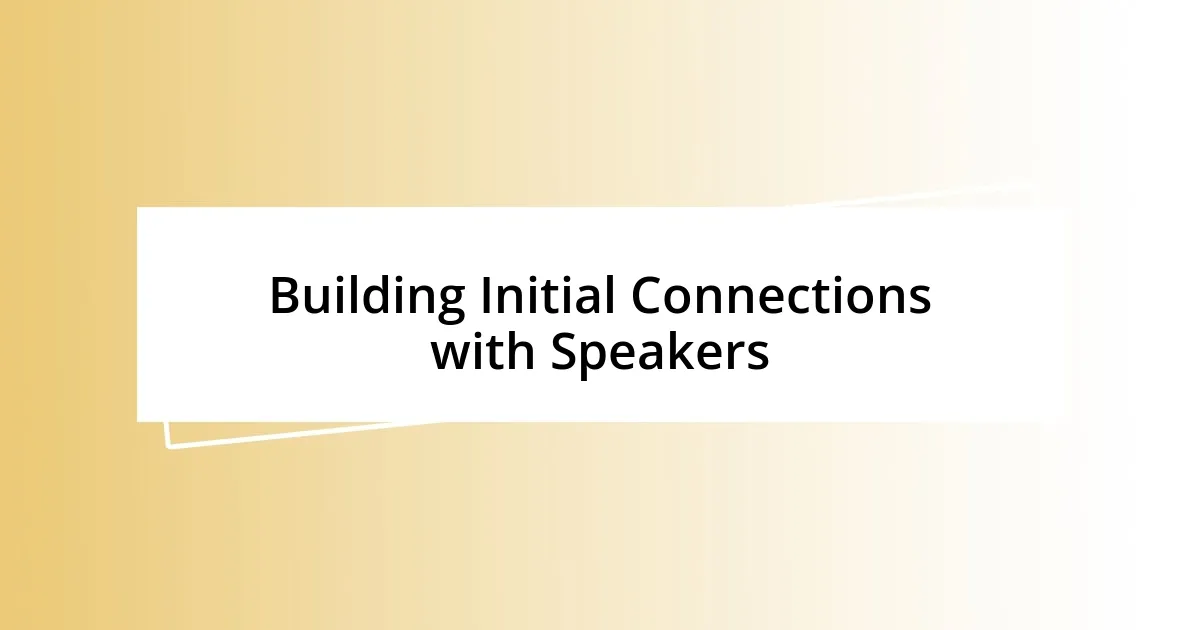
Building Initial Connections with Speakers
When I think about building initial connections with speakers, one of the first things that comes to mind is the art of genuine conversation. I remember a time at a networking event when I approached a speaker whose work I admired. Instead of jumping straight into professional topics, I started by complimenting his unique storytelling style. That simple gesture opened the door to a dynamic conversation. It reminded me that personal connections are often ignited through authentic interest and shared stories.
Engaging in a way that goes beyond small talk is crucial. For me, asking open-ended questions about their experiences—like “What motivated you to explore this topic?”—can lead to deeper discussions. I find that when I express my curiosity, speakers are usually eager to share their journeys, creating a foundation of trust. This back-and-forth not only establishes rapport but also allows for a shared understanding of our respective passions.
To further streamline this process, I’ve discovered that preparing a few thoughtful topics in advance helps. I recall a particularly memorable encounter with a speaker at a conference where I had researched a recent book they published. When I mentioned a specific chapter, their face lit up, and we dove into a rich discussion. This preparation shows respect for their work and can lay the groundwork for a lasting relationship.
| Approach | Outcome |
|---|---|
| Genuine Compliments | Opens doors to deeper conversations |
| Thoughtful Questions | Builds rapport and establishes trust |
| Research & Preparation | Demonstrates respect and interest |
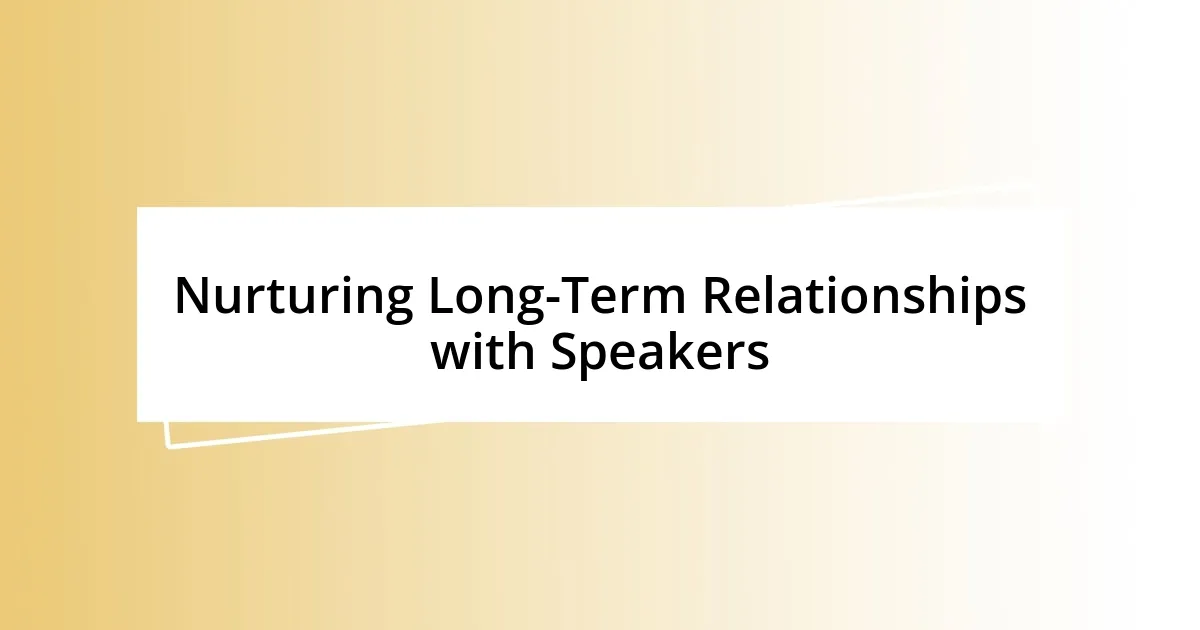
Nurturing Long-Term Relationships with Speakers
Nurturing long-term relationships with speakers requires consistent engagement and genuine follow-ups. I recall a time when I invited a speaker for coffee a few months after their presentation. Instead of merely thanking them for their talk, I asked how their new projects were progressing and shared relevant updates from my side. This simple gesture reinforced to them that our connection mattered beyond the initial event.
Building on that, I find that staying in touch through social media is a powerful tool. For instance, after attending a seminar, I took the time to comment on a speaker’s recent blog post. I shared my thoughts on how their ideas could impact our industry and asked a thoughtful question about their perspective. It’s interesting how a single strategic comment can lead to more in-depth discussions and even collaborations down the road.
At the end of the day, I genuinely believe transparency and authenticity are key. When I openly share my struggles or successes with a speaker, I notice a deeper bond forms. It’s almost as if we become partners in a shared journey, cheering each other on along the way. Isn’t it remarkable how vulnerability can pave the road to lasting professional relationships?
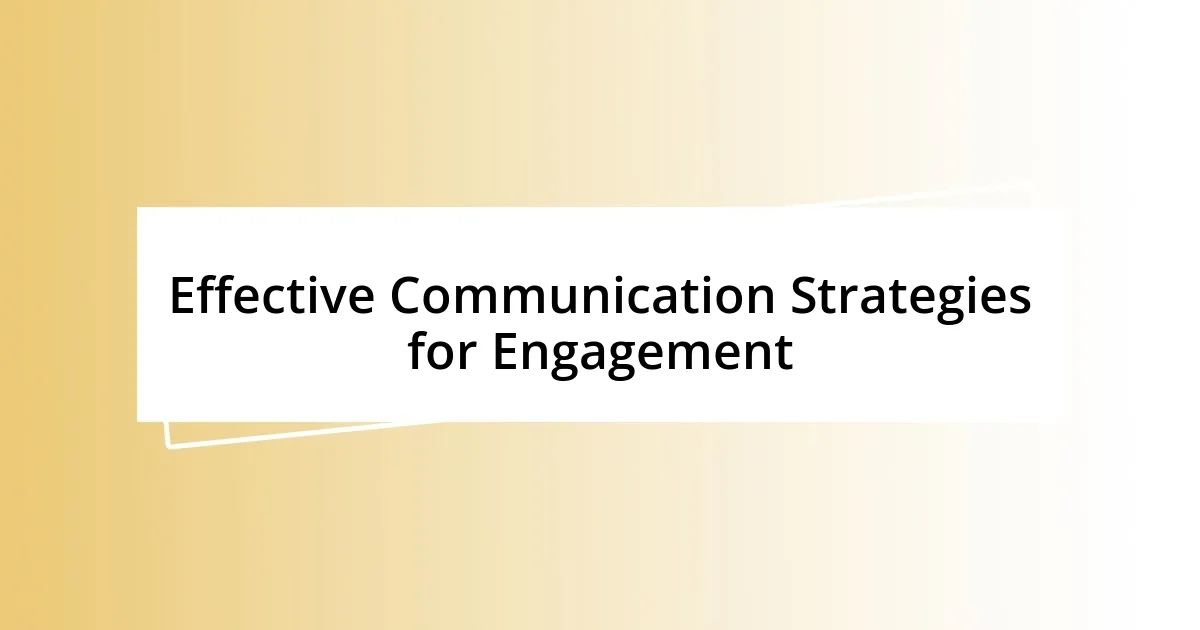
Effective Communication Strategies for Engagement
Effective communication is more than just exchanging words; it’s about making each interaction count. I remember a particularly enlightening conversation with a speaker who emphasized the importance of active listening. Instead of just waiting for my turn to speak, I practiced truly hearing her ideas—reflecting back what she said and asking follow-up questions. That shift in engagement not only deepened our connection but also made her feel valued and understood.
Using visual aids during discussions can also enhance engagement. I once shared a compelling chart that illustrated trends in our field while discussing strategies with a speaker. The moment her eyes lit up as she recognized the data was priceless. It’s that instant connection—seeing someone grasp an idea— that reinforces the power of visuals in facilitating fruitful conversations.
I often wonder how many missed opportunities arise from not embracing a two-way dialogue. When I introduced a feedback mechanism after a talk, asking the speaker for their insights on my presentation style, it created a space for mutual growth. This willingness to improve together not only strengthened our relationship but also fostered a collaborative spirit. Isn’t it amazing how opening up a channel for feedback can transform a simple interaction into a rich dialogue?
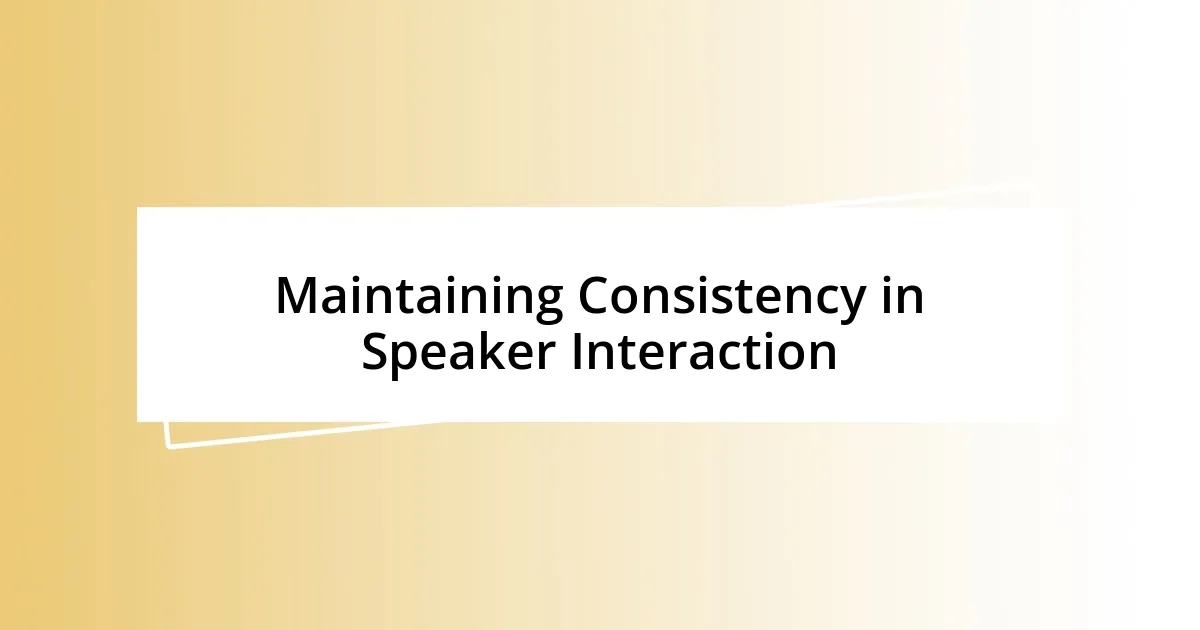
Maintaining Consistency in Speaker Interaction
Maintaining consistency in speaker interaction is crucial for nurturing those valuable relationships. I remember a period when I made it a point to reach out to several speakers I had met over the years, sending them brief updates or interesting articles related to their expertise. This not only kept our connection alive but also showed them that I genuinely valued what they brought to the table. Have you tried checking in regularly? It’s remarkable how a simple message can reinforce ties and even spark new opportunities.
Moreover, setting a routine can help in staying connected. For instance, I’ve started dedicating one afternoon each month to catch up on conversations with speakers I admire. Sometimes I’ll shoot an email, while other times, I might invite them for a virtual coffee chat. This intentionality has allowed me to maintain dialogue over time, making conversations not just happenstance but meaningful check-ins. What appears to be a minimal effort often leads to deeper insights and shared ideas for upcoming projects.
Lastly, I find it essential to celebrate milestones together. If a speaker launches a new book or achieves an impressive accolade, I make it a habit to reach out with a quick note of congratulations. I distinctly recall sending a heartfelt message to a speaker who had just completed their doctoral studies. Their gratitude was palpable, and it reminded me that relationships thrive on mutual acknowledgment and support. Isn’t it heartening to think that being present in someone else’s journey can enrich your own?
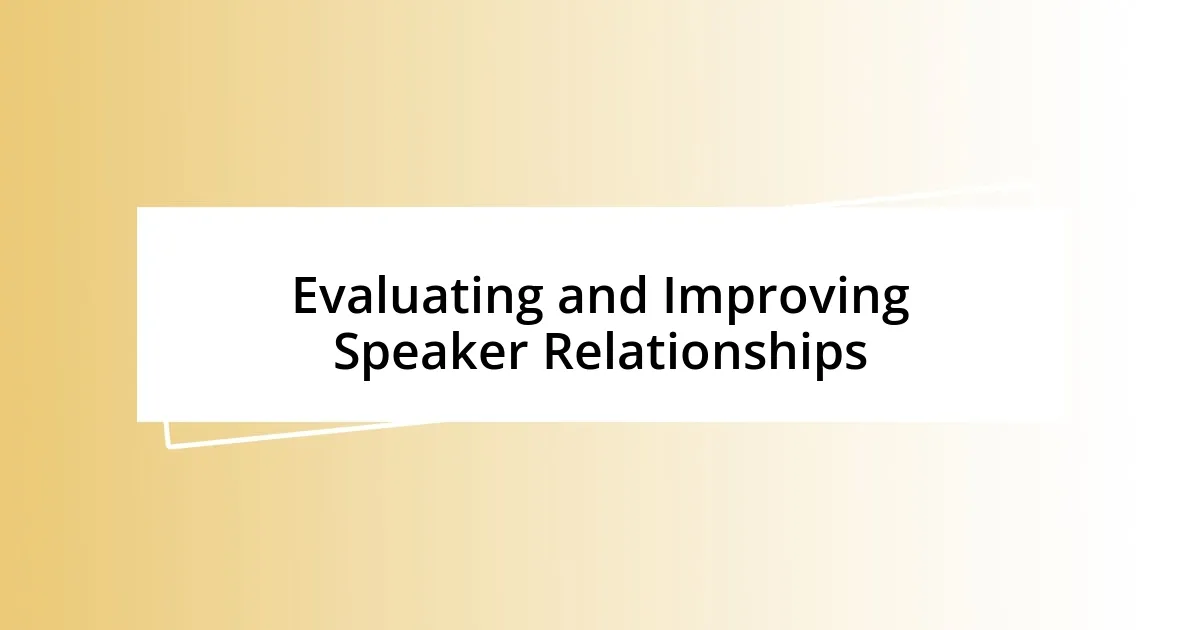
Evaluating and Improving Speaker Relationships
Evaluating and improving speaker relationships requires a keen eye and genuine effort. I recall a time when I organized a feedback session after an event. It was enlightening to hear the perspectives of the speakers on how we could enhance collaboration. This not only pointed out areas for improvement but also reassured me that they valued my input, creating a warm atmosphere of mutual respect. How often do we take the time to genuinely assess our partnerships?
To further deepen these connections, I prioritize regular check-ins to gauge how our collaboration is evolving. During one of my catch-ups, a speaker shared an innovative idea they were working on, and it struck me how my previous engagement had encouraged them to open up. Isn’t it fascinating how nurturing an open dialogue can lead to unexpected opportunities for both parties?
Throughout these interactions, I pay close attention to non-verbal cues and the energy in our conversations. For example, during a recent discussion, a speaker seemed quite engaged when discussing potential future projects. It prompted me to explore their passions more deeply. This awareness transforms evaluations into a richer experience. Have you ever considered how much the tone and energy of a conversation can reveal about the potential of a relationship?












